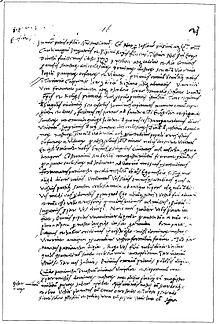
Summary
The Placitum of Riziano (Italian: Placito del Risano; Slovene: Rižanski zbor) was a dispute that took place c. 804 around the river Riziano, probably at Rižana in modern Slovenia. The document is important for the history of Capodistria (Koper) and Trieste, because it is the first written evidence of the presence of Slavic-speaking population in Istria close to Trieste.[1][2]

Legates sent by Charlemagne heard complaints by the leaders of Istria about the bishops and the duke of Istria, John. The document is believed to have been recorded on the orders of Fortunatus II, patriarch of Grado.[3] A point of historiographical contention is the fact that only the leaders of the coastal towns of Istria were present; one explanation for this is that the issues being discussed (for example, the abolition of the right of the townspeople to fish) only affected the coast.[4]
The Latin text has been edited many times, but the standard edition is by Manaresi.[5] The text has been translated into various modern languages.[6]
References edit
- ^ "Copia archiviata". Archived from the original on 24 August 2012. Retrieved 11 November 2012. Liceo F. Petrarca – Trieste - a.s. 2001/2002 - Il Carso tra natura e cultura
- ^ Janko Jež - Monumenta Frisingensia: la prima presentazione in Italia dei Monumenti letterari sloveni di Frisinga del X-XI secolo ...: con traduzione dei testi, cenni di storia del popolo sloveno e dati sugli Sloveni in Italia – Trieste: Mladika; Firenze: Vallecchi Editore, 1994 - ISBN 88-8252-024-2
- ^ Krahwinkler, Harald (25 April 2005). "Patriarch Fortunatus of Grado and the Placitum of Riziano". Acta Histriae. 13 (1). Annales Publishing House: 63–78. Retrieved 24 November 2017.
- ^ "Placito del Risano - 804 A.D." IstriaNet.org. 20 March 2016. Retrieved 24 November 2017.
- ^ I placiti del Regnum Italiae, ed. C. Manaresi (Rome, 1955), vol. I, no. 17, pp. 48-56
- ^ French translation: Ph. Depreux, Les societes occidentales du milieu du VI a la fin du IX siecle (Rennes, 2002), pp. 293-99, online; English translation: C. West, 'In The Time of the Greeks', Turbulent Priests
Further reading edit
- F. Borri, 'Neighbours and relatives: the plea of Rizana as a source for Northern Adriatic elites', Mediterranean Studies 17 (2008),1-26
- T. S. Brown, Officers and Gentlemen and Officers: Imperial Administration and Aristocratic Power in Byzantine Italy, A.D.554-800 (London, 1984)
- J. Davis, Charlemagne’s Practice of Empire (Cambridge, 2015), pp. 102–4, 274-7
- M. Innes, ‘Framing the Carolingian Economy’, Journal of Agrarian Change 9 (2009), 42-58.


